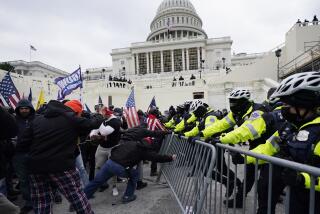Few New Details on 9/11, but This Time They Could Sink In
WASHINGTON — The details may not have been altogether new. But there they were, all in one place, packaged under television lights and being dissected by the country’s highest officialdom in front of an American public that has worked up a new appetite for information on the Sept. 11 attacks.
For many Americans, hearings this week told for the first time of faulty intelligence, of miscues and of events beyond the government’s control. They heard prominent people suggest that somebody had dropped the ball in the war on terrorism.
And, for the first time in 2 1/2 years, it may have begun sinking in, experts said Wednesday.
The hearings “could really raise Americans’ concern, and I think it should,” said Graham Allison, a former top CIA official.
Over two days, a parade of Cabinet secretaries, intelligence chiefs and other officials revealed what they saw and thought as the country veered toward a catastrophe that transformed its view of its primary national security threat.
Americans heard their top leaders calmly but passionately explaining their thinking and defending their decisions.
Their testimony was often persuasive, but it might have provided little comfort about what happened in 2001 or about the government’s future capabilities.
A senior Democratic congressional aide said the commission members came across as “restrained ... and this will help their credibility” when they put out their final report.
Some experts said they believed that although some of the information had been out before, its presentation in this setting, by such an impressive cast of characters, could reshape Americans’ opinions of how Sept. 11 was handled.
Interest has been heightened by controversy over the course of the Iraq war and a critical new book by Richard Clarke, who served as a counterterrorism advisor to Presidents Clinton and George W. Bush.
Clarke, who also worked in the two previous Republican administrations, in his book accuses Bush of neglecting the war on terrorism.
Patrick Clawson, deputy director of the Washington Institute for Near East Policy, said the hearings could have a harmful effect because of the way Clarke attacked Bush administration officials.
“This is going to reinforce the perception that civil servants are not really that, but are masking an agenda,” said Clawson.
Although the hearings had flashes of partisanship, many observers thought they were less strident than they could have been, especially in an election year.
“Most of the senior officials who testified made a good presentation and a very reasonable defense of what they did or didn’t do,” said Gordon Adams, a former Clinton administration official who is now at the Elliott School of International Affairs at George Washington University. “They came across as well-intentioned.”
But Allison, the former CIA official, faulted the commission and its witnesses for not acknowledging how serious the failings of government had actually been.
Allison said that although he supported the administration’s aggressive approach to counterterrorism in the Middle East, “the mantra here was ‘no mistakes were made ... there was nothing else we could do.’ ”
In testimony Tuesday, former Secretary of State Madeleine Albright and former Defense Secretary William S. Cohen, both of the Clinton administration, explained how they had considered a stronger military response to repeated attacks by Al Qaeda, but had rejected it for fear that it would not have support at home or abroad.
Top Bush administration officials explained how they wanted to do more than the Clinton team’s “pinprick” cruise missile barrages -- but were still in a policy review when the Sept. 11, 2001, attacks took place.
On Wednesday, witnesses discussed evidence suggesting that the CIA was held back in going after Osama bin Laden. They said that because of a federal ban on assassinations, agents would only be allowed to kill him during the course of a broader attack on his forces. This evidence, set forth in the commission’s report, indicated that the CIA, as well as the public, was confused by the rule used to get around the ban.
The hearings brought out details related by commission staff members in gripping narrative that seemed suitable for a novel. In a report released Wednesday, the staff of the commission said that U.S. Predator surveillance drones twice saw security details around a tall robed man they believed to be Bin Laden.
But CIA Director George J. Tenet and the Joint Chiefs of Staff opposed Clarke’s pressure to use Predators to kill Bin Laden, fearing that the ability to strike with missiles was imperfect.
Allison, now director of the Belfer Center for Science and International Affairs at Harvard University, said the hearings could kindle demands for more effective action.
“If we’re serious about having a war on terrorism, we need to correct what happened then,” Allison said.
More to Read
Sign up for Essential California
The most important California stories and recommendations in your inbox every morning.
You may occasionally receive promotional content from the Los Angeles Times.











